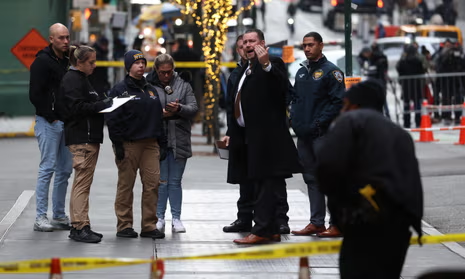Tragic Gun Incident Unveiled
The devastating UnitedHealthcare scandal has sent shock waves across the United States, sparking questions about ethical responsibilities in healthcare management. The connection between one of the nation’s largest health insurers and a tragic gun incident, tied to a whistleblower’s revelations, has raised the stakes in this already polarizing controversy.
In this article, we delve into the critical details of the scandal, the tragic consequences, and what this means for patients, healthcare reform, and accountability. Brace yourself for a story of betrayal, morality, and lessons we must not ignore.
The UnitedHealthcare Scandal: What Went Wrong?
The storyline of the UnitedHealthcare scandal begins with Luigi Mangione, a reputable healthcare provider contracted by the insurance giant. According to reports, Mangione flagged various unethical practices within UnitedHealthcare and alerted authorities about inappropriate denials of care, some of which led to tragic consequences.
The turning point, however, came when NYT published a revelation: Mangione himself became embroiled in a heated confrontation that tragically escalated into a gun-related incident. This shocking development has blurred lines between whistleblowing, corporate retaliation, and personal accountability.
While exact details remain under investigation, questions loom large around whether UnitedHealthcare’s systemic pressures were responsible for pushing the boundaries too far.
Deep-Rooted Issues in the Healthcare Industry
The UnitedHealthcare scandal is just one of a growing list of crises spotlighting the frailties within America’s healthcare system. Patients across the country report increasing incidences of care denials, profit-over-compassion policies, and insurmountable red-tape bureaucracy.
According to U.S. healthcare statistics, over 25% of patients face claim denials from insurance companies every year. These practices suggest a systemic need for reform beyond isolated scandals.
Luigi Mangione and the Tragic Gun Incident: What We Know
Luigi Mangione’s role in this scandal became even more controversial when his whistleblowing activities allegedly culminated in a gun-related altercation. Eyewitness reports described the incident as “avoidable,” but tensions ran high after months of workplace intimidation and unending stress.
While the precise timeline remains unclear, sources suggest that Mangione was under extensive scrutiny by UnitedHealthcare, facing potential legal and professional repercussions for his allegations. Some insiders claim these pressures might have fueled an already volatile situation.
Community Reaction and Public Outcry
The incident sent shockwaves through the healthcare industry and beyond. Advocacy groups rallied in support of Mangione, condemning corporate greed and its toll on mental health.
Social media platforms became a battleground for heated debates. Hashtags like #HealthcareReformNow and #JusticeForWhistleblowers trended nationwide, emphasizing grassroots momentum for systemic change.
What Can Be Learned from the UnitedHealthcare Scandal?
The UnitedHealthcare scandal unveils deep systemic flaws that extend beyond one company or one incident. Here’s what this tragedy teaches us:
- The importance of protecting whistleblowers: This incident underscores the need for stronger whistleblower protection laws. Without sufficient safeguards, those who dare speak out are left vulnerable.
- Ethics over profits: The balance between profitability and ethical care must be recalibrated. Organizations like UnitedHealthcare must prioritize patient outcomes over shareholder interests.
- Mental health matters: High-stakes, high-pressure environments can prompt crises. This case serves as a reminder of why organizations must prioritize mental health support for employees.
Making the Healthcare Industry Accountable
If the UnitedHealthcare scandal proves one thing, it is that accountability cannot be optional within the healthcare system. Industry leaders must adopt transparency in their practices and embrace legitimate concerns voiced by both patients and employees.
Legislators must step up too. Senate hearings on healthcare reforms have become more frequent, but tangible outcomes remain elusive. The urgency of cases like this should push for swifter action.
Where Do We Go from Here?
The UnitedHealthcare scandal shows how dangerously corporate pressures can clash with personal priorities. As public sentiment builds, it is only a matter of time before companies face increasing accountability on a federal scale.
For now, the key focus should remain on supporting the victims of this tragedy—whether they are whistleblowers, employees, or patients. Tactical reforms must follow soon after.
It is essential to keep the conversation alive. For more updates on this and other major stories, visit the dedicated news team at ZexNews.
In Conclusion
The UnitedHealthcare scandal is a stark reminder of the cost of unchecked corporate greed. While the tragedy of the gun incident has shaken an entire industry, it also paves the way for important conversations about healthcare ethics and reform.
As investigations continue, one thing is abundantly clear: we cannot afford to ignore the systemic issues boiling under the surface of America’s healthcare industry.
“`






1 Comment